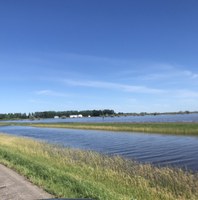Self-care tips in times of storm stress
(Click the image below to view a high-resolution image that can be downloaded)
As rains continue in some parts of the region and storm threats hamper work or travel plans, many individuals and families are facing the stress of property damage and uncertain weather conditions. The hours they must spend in dealing with weather stresses can be long, continuous and exhausting.
“The emotional and physical needs of those who are undergoing stress from weather conditions are sometimes forgotten during a crisis,” says Sean Brotherson, North Dakota State University Extension family science specialist. “They may not consider their own needs for self-care, or they may be too occupied with other tasks to handle personal or family needs.”
“Individuals sometimes try to be invulnerable to fatigue, stress, frustration and depression,” continues Brotherson. “Often, the demand on their energies is so great that they think they can muddle through. However, individuals and families need help, encouragement and assistance in times of weather stress.”
People negatively affected by recent storms and their family members need to take care of themselves to have the emotional and physical resources to deal with weather-related stresses.
Brotherson has self-care tips for the emotional and physical well-being of people affected by such stresses:
- Get sufficient sleep
- Eat well-balanced meals as much as possible
- Set up and maintain a structured routine, if possible
- Learn to say no without feeling guilty during times of demand
- Take time for stress breaks (10 minutes every couple of hours)
- Change your environment by taking short breaks
- Realize when a situation or problem requires help from others
- Delegate tasks to others or call for additional support if needed
- Be aware of your energy limits and stop when these limits have been reached
- Prioritize your time
- Know your strengths and weaknesses
- Communicate with people who understand your tasks
- Practice optimism and humor
Individuals feeling discouraged or overwhelmed by stresses can use help from people not directly affected by the weather conditions. Brotherson advises that family members or community members, including mental health workers, can provide needed support so they can get personal or work tasks accomplished in the time that is available.
“To help critical tasks get done in a time of stress, the load must be shared,” says Brotherson. “Affected individuals and their families need to know that others are willing to stand with them and provide continuing support.”
For more details about dealing with disasters and stress, visit NDSU’s disaster education website at ndsu.ag/disasterinfo.
NDSU Agriculture Communication – June 24, 2025
Source: Sean Brotherson, 701-231-6143, sean.brotherson@ndsu.edu
Editor: Dominic Erickson, 701-231-5546, dominic.erickson@ndsu.edu


